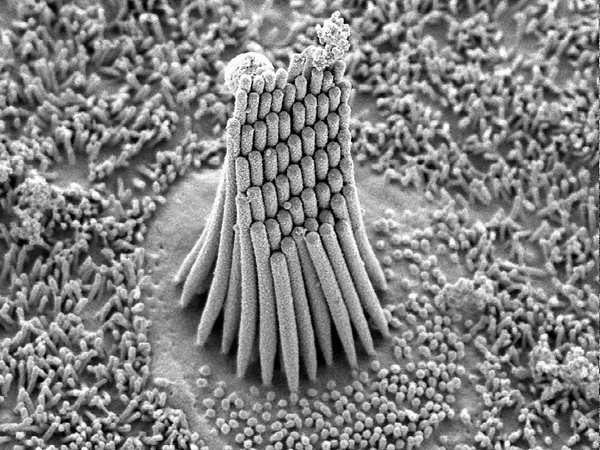(单词翻译:单击)
听力文本
This is Scientific American — 60-Second Science. I'm Christopher Intagliata.
Long ago, before Band–Aids, or even medicine of any kind, our ancestors evolved to heal cuts themselves. If you got sliced open, the body blocked it up, to prevent blood loss, water loss, infection. But as we gained that power—we sacrificed something else.
"So we've evolved to heal very quickly, or as quickly as possible, at the expense of regenerating skin the way it used to be." George Cotsarelis, a skin biologist at the University of Pennsylvania who studies that newly healed skin—aka scars. "And the feature of scars is that they don't have hair follicles, sweat glands or fat."
In that observation lies a clue, which Cotsarelis and his team investigated in mice. They found that, when mice were injured, hair follicles sometimes regenerated at the wound site. And where hair cells appeared, fat cells did, too—the fat that sits under normal skin, as a cushion. "The bottom line is that the follicle has these almost magical powers where it's really normalizing the skin architecture." Meaning hair cells are good for reducing scarring.

In their latest work, in the journal Science, they isolated a growth factor called BMP from the hair follicles. It's a signal the follicles send to neighboring cells. They then exposed human scar cells to BMP, in a dish. They found that the growth factor did indeed help to reprogram the scar cells to fat cells, nudging them down a different developmental path.
Cotsarelis says a magic scar-free ointment is probably a ways off. "It's a very complicated process and knowing the timing of when to introduce things, how to introduce them, and the delivery of the compounds is important." But if we figure that out—we might someday be able to coax our skin to heal itself...without leaving visible evidence behind.
Thanks for listening for Scientific American — 60-Second Science Science. I'm Christopher Intagliata.
参考译文
这里是科学美国人——60秒科学。我是克里斯托弗·因塔利亚塔。
很久以前,在没有邦迪和其他类似的药物时,我们的祖先进化出了伤口自愈的能力。如果你有切伤,身体就会将伤口处封锁,防止血液流失、水分流失和伤口感染。但是,我们在获得伤口自愈能力的同时,也失去了一些东西。
“我们进化出了可以快速或者说尽快愈合伤口的能力,但是这种能力却是以牺牲皮肤再生能力为代价的。”乔治·科特萨雷利斯是宾夕法尼亚大学的皮肤生物学家,他主要研究新愈合的皮肤,也就是伤痕。“伤痕的特点是没有毛囊、汗腺或脂肪。”
这一观察中存在着一个线索,科特萨雷利斯和他的团队对老鼠进行了研究。他们发现,当老鼠受伤时,毛囊有时会在伤口处再生。毛囊细胞出现时,脂肪细胞也会出现,脂肪就位于正常皮肤的下面,起缓冲作用。“关键在于,小囊泡有神奇的功能,它能够使皮肤组织正常化。”这意味着毛细胞有益于减少疤痕。
他们在《科学》期刊上发表了最新研究成果,他们从毛囊中分离出了一种名为骨形成蛋白的生长因子。这是毛囊向邻近细胞发出的信号。然后他们在培养皿中让人类的疤痕细胞暴露在骨形成蛋白中。他们发现,生长因子确实有助于将疤痕细胞重组为脂肪细胞,促使他们进行不同程度的修复。
科特萨雷利斯表示,这远远不足以研制出一款神奇的无疤痕软膏。“这是一个非常复杂的过程,弄清楚什么时间进行处理、怎样处理以及化合物的传送都非常重要。”但是,如果我们把那个过程了解清楚,那未来的某一天我们可以诱导皮肤进行自愈,同时也不会留下疤痕。
谢谢大家收听科学美国人——60秒科学。我是克里斯托弗·因塔利亚塔。
译文为可可英语翻译,未经授权请勿转载!
重点讲解
重点讲解:
1. block up (使)封闭;(使)堵住;(使)封死;
例句:'Any holes in the kitchen where the mice are getting through?' – 'I've blocked them up.'
“厨房里还有没有老鼠洞?”——“我已经把它们堵死了。”
2. at the expense of 以…为代价;
例句:He finished the job at the expense of his health.
他以自己的健康为代价完成了工作。
3. be good for 有利的;有益的;
例句:Cereal products are good for our health.
谷物产品对我们的身体有益。
4. figure out 想出;理解;弄清;
例句:They might have figured out this riddle by now.
他们现在也许已经解开这个谜了。


